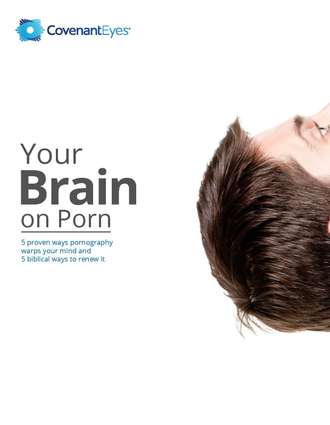When the news broke that the recently elected Speaker of the House, Mike Johnson (R-La), used a Christian technology service called Covenant Eyes to monitor his online habits for porn, reactions varied. The fact that his then-17-year-old son Jack served as his “accountability partner,” receiving updates of his father’s internet activity (and vice versa) sounded particularly sordid and strange. “I’m proud to tell ya, my son has got a clean slate,” Johnson announced at the War on Technology conference hosted by Cypress Baptist Church in Benton, Louisiana.
Some pronounced Johnson’s use of a porn detection service creepy, weird, and a potential security breach given his office; while others saw it as normal, common, and even admirable. Where people fell on the spectrum of judgment depended on how much they understood, approved of, and lived with evangelical Christians’ views on porn. Despite the initial news coverage and subsequent outrage, Johnson’s pronouncements on porn and Covenant Eyes haven’t received as much attention as reports documenting and raising the alarm about his anti-democratic promotion of 2020 election lies in an effort to overturn the results and keep Trump president.
This focus is understandable given Johnson’s ascension to a position that makes him second in line to the presidency and the potential role he could play in the 2024 election. However, Johnson’s feelings about porn are every bit as important, as they are inextricably linked to his belief that the Bible should be the sole legitimate source for public policy and that the United States is a “biblical” republic.
The entwinement of Johnson’s religious and political beliefs has been usefully examined and thoroughly dissected in a piece by Annika Brockschmidt here on RD, painting a clear picture of Johnson as a textbook White Christian nationalist—a true believer in the manifest destiny and divine providence of right-wing reactionary Christianity, White supremacy, and authoritarian politics in the United States. In addition to his Christian nationalism, Brockschmidt outlines Johnson’s intersecting beliefs in “theonomy,” “dominionism,” and “Seven Mountains theology” as well as his ties to the New Apostolic Reformation (NAR), all of which helpfully explicates Johnson’s “biblical worldview.” Through his work with Alliance Defending Freedom (ADF), Johnson put his vision for the nation into practice as he railed against “culture war” issues like the legalization of gay marriage and reproductive rights using language that dehumanized and demonized women and LGBTQ+ people.
However, to understand how Johnson became the kind of White Christian man who would claim that if gay marriage were legalized, “a person [could] marry their pet,” or suggest that the loss of “all those able-bodied workers” due to Roe v. Wade had such a negative effect on the economy that women should be compelled to give birth, we need to consider his biblical worldview as not only ideologically constructed and practiced, but bodily inscribed and reiterated. The libidinal economy and fascist desire that drives White evangelical men like Johnson to presume that divine providence guides their every word and deed, both at home and in government, is cultivated through their everyday relationships to porn, sex, masculinity, technology, and women.

Men in an “accountability relationship” text for support. Image: Covenant Eyes website.
On the Covenant Eyes website, porn “addiction” is couched as a masculine sin to produce heteropatriarchal gender relations as the norm. A dropdown menu under the “Why Am I Here?” tab reads, first, “To overcome porn, as a Man,” and then “To overcome porn, as a Woman.” Clicking on the different links for “man” and “woman” leads to distinct experiences.
The men’s site is far more interactive and engaging. Unlike women, men have “scenarios.” Their page opens to a portfolio of stories about porn use under nine photos of ruggedly handsome men representing an impressive array of diversity in appearance, race, ethnicity, age, and issue—a showcase of faces through which visitors can imagine their likeness above a porn problem. Clicking on the varied visages and scenarios lead to words of encouragement, free downloads of books like Your Brain on Porn and More Than Single, and free training sessions. Though their looks differ, each man appears confident and contemplative, with a sense of purpose. Many stare straight into the camera or are captured in chiseled or bearded profile.
No one on the women’s site is as fleshed out. It has fewer images of actual women, and all of them are looking off camera, including one who gazes at a man next to her on a couch, presumably her husband. Illustrations and a single statistic take up a lot of space—33% of young adult women use pornography monthly; 17% consider themselves addicted to porn; 87% of Christian women have watched porn. The glaring disparity between Christian women who have “watched” porn (perhaps only once) and women overall who consider themselves “addicted,” suggests that Covenant Eyes’ target audience is Christian men.
The top left profile on the men’s page, the first one that catches your eye, is a White man with a burly red beard who looks like he’s on a spiritual quest. He wistfully gazes to the heavens above the scenario, “Porn Makes Me Feel Far From God.” Once men click to “learn more,” they’re admonished:
“Sin hates your life. Truly. Every survey on porn tells us that a lot of Jesus-loving Christians struggle with pornography. How many times have you begged God to take your porn addiction away?”
Further down, under the heading “You’re at War, Pray Like It,” men are told:
“‘There are no atheists in foxholes.’ This statement from the battlefield reminds us that in moments of intense fear or threat, everyone turns to God. If you’re going to turn back to God, know right now that sin will NOT give up its ground easily. Whatever you choose to fight will fight you back.
Have you ever watched a movie about DDay? The scenes are intense and graphic. It was a tangled mix of abject fear and intense focus on a single task. Kill or be killed. Is that similar to how you are going to approach your battle with porn? We hope so.
Now here’s the good part. You don’t have to fight alone. If getting started at Covenant Eyes feels like a battle, contact our Member Care Team, and we’ll join you on the battlefield.”
The spiritual seeker is also GI Joe, a man ready to fight against porn for God. By priming this sense of embattlement, the micropolitics of fascism in its addictive, fleshy, intimate form, is interconnected to the macropolitics of fascism in its violent, dominionist, spectacular practice. White evangelicals need not rely on “culture war” issues to feel embattled and thriving—all they need is a body. The sense of persecution White evangelical men like Johnson feel in, and as a result of, non-Christian “culture” isn’t just in response to legal battles or political rhetoric, but also to teachings about porn, masculinity, sex, women, intimacy, and desire that they grew up with and instill in their children—teachings that are bodily transmitted and re-enacted. Manichean us versus them sensibilities need not play out on an explicitly political stage to be cultivated through embodied repetition in ways that statistics about religious and party affiliation are unable to show.
Minority rule and processes of radicalization do not rely on the flush of victory but on the blush of defeat. Covenant Eyes surveils online activity and routinizes shame; its business model requires that men feel addicted to porn, not cured. If it can keep men coming back to use its products and services, it doesn’t require a large customer base. Similarly, White Christian supremacy’s strength is not in numbers, but in theological-political devotion and ferocity.
On the spiritual battlefield against porn, Johnson is training his son to be a Christian fascist like himself. His fatherly pride over his son’s “clean slate” says more about his investment in Jack’s capacity for disciplining his body to desire-control than it does actual porn use. Dismissing this process of father-son bonding as merely creepy or morally wrong doesn’t go far enough in assessing the depth and breadth of its importance and impact on the political subjectivity of White evangelical men and the fomenting of fascist desire.
This spiritual battle is also grounded in scientific research. Covenant Eyes pairs neurological studies that link addiction and porn with fear-inducing statistics. The opening to the free downloadable e-book Your Brain on Porn proclaims, “those who self-identify as ‘fundamentalists’ are 91% more likely to look at pornography than the general public.” Such data is used to frame a study on the “neuropathways for the addictions” which theorizes that “sex is perhaps the most powerful addiction because it…offer[s] arousal, satiation, and fantasy.” Your Brain on Porn also quotes from a book called Wired for Intimacy, by Dr. William Struthers, which describes the dreaded “porn path”:
“Like a path is created in the woods with each successive hiker, so do the neural paths set the course for the next time an erotic image is viewed. Over time these neural paths become wider as they are repeatedly traveled with each exposure to pornography. They become the automatic pathway through which interactions with women are routed. The neural circuitry anchors this process solidly in the brain. With each lingering stare, pornography deepens the Grand Canyon-like gorge in the brain through which images of women are destined to flow. This extends to women that they have not seen naked or engaging in sexual acts as well. All women become potential porn stars in the minds of these men.”
Fascist desires are calibrated through entanglements of body, brain, and technology. This war on pornographic images and imagination figures women as threats and wives as porn stars who must work freely and frequently to secure the fidelity and salvation of their lustful husbands. Johnson recalled that he heard of Covenant Eyes at a Promise Keepers event, where Christian men bond over feelings of shame and fear.
Some evangelicals are convinced of the indoctrination of “gender ideology” in public schools because they work so hard to indoctrinate their children with their version of gender ideology at home and in church. Threat is displaced from where it belongs (men in positions of power within families and congregations) to where it does not (teachers who identify as, or teach about, LGBTQ+ people). Among Southern Baptist churches, like the one where Johnson’s family worships, sexual abuse is unsurprisingly but tragically endemic due in part to complementarian gender doctrine, wherein men and women are “equal but different,” both made in God’s image but for distinct roles—men as headship leaders and women as submissive helpers.
In addition to the spiritual and neurological ills of porn addiction, Covenant Eyes states:
“The church must remain clear that pornography is not essentially wrong because it is addictive, but because of its titillating and deceptive message: it rips sexuality from its relational context and presents human beings not as creatures made in God’s image, but as sexual commodities, something to be bought and sold.”
Johnson’s comment about Roe v. Wade curtailing the production of “able bodied workers” essential to a thriving economy suggests that his pornographic gaze frames women as commodities in the very way that Covenant Eyes says it seeks to eradicate. (Tellingly, the language of Johnson’s anti-abortion stance is that of eugenics, slavery, and fascism.) For White evangelical Christians, porn is a powerful instrument in their spiritual and worldly war because it posits them as morally righteous even as it reinforces heteropatriarchal relations that reiterate fascist desire and the religious conviction that they are meant to rule over the nation and world.





